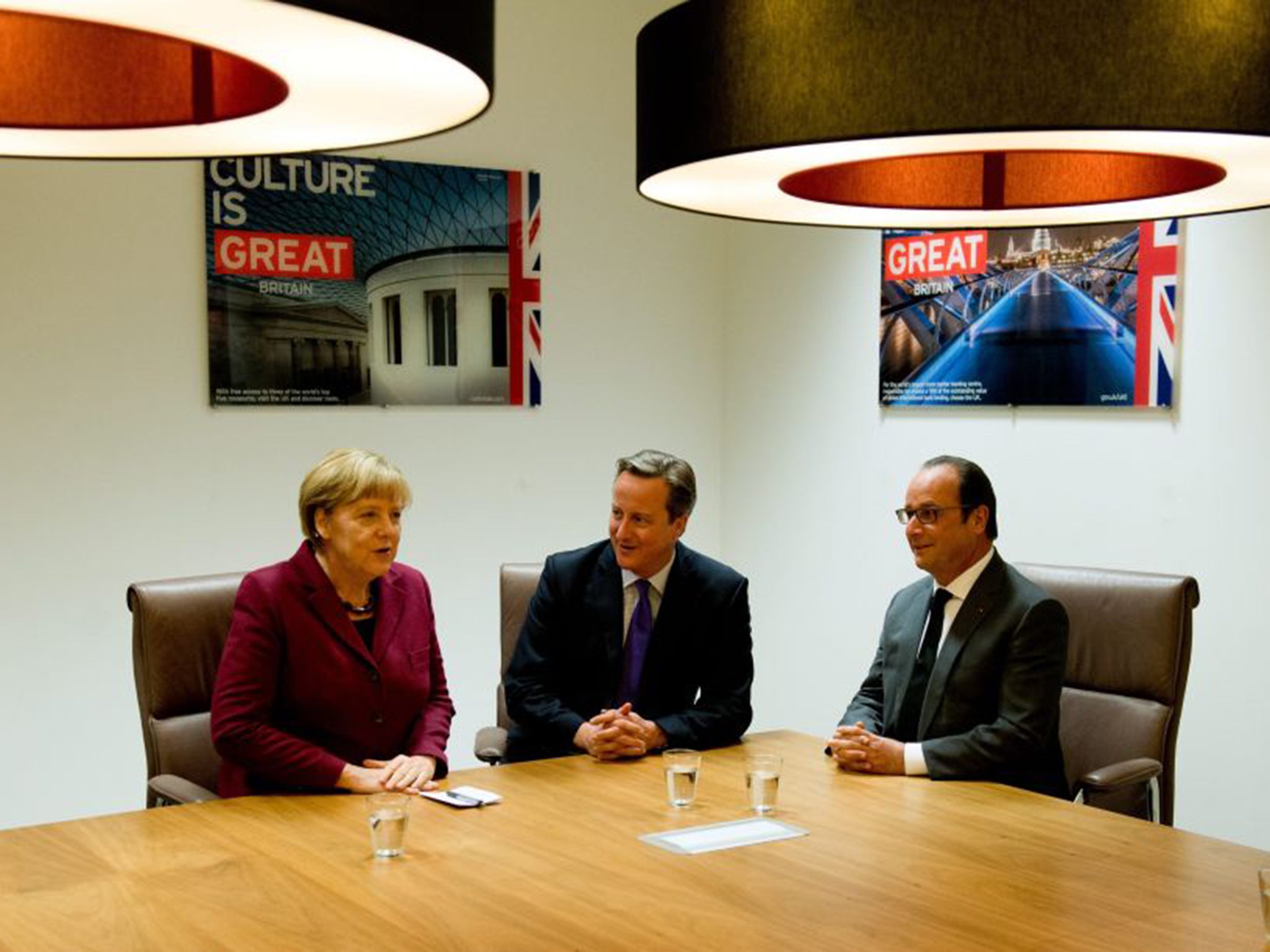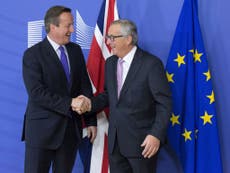EU referendum: Procrastination only works if you have done your homework
The European Union is used to delays, but the Prime Minister’s preparation for the haggling to come is not impressive

David Cameron and the European Union have at least something in common: a fondness for procrastination. Cameron has been irritating his European counterparts for many months now by refusing to come clean about exactly what he wants from a renegotiation of the UK’s relationship with the EU.
The EU, for its part, is deeply attached to deferral and delay. Procrastination is deeply engrained into its ways of working. That is in part a reflection of the difficulty of finding agreement between 28 states: contentious issues get put off until the right moment, when a sense of urgency can help to achieve a compromise.
Procrastination also reflects the difficult times that Europe is living through. Non-urgent business is pushed aside for whatever is the current crisis – an air-pollution scandal; a eurozone wobble; a court-ruling against the export of data to the US; a sharp increase in migration.
Last week, the EU’s preoccupation with migration squeezed aside the rather less important issue of the UK’s relationship with the EU. Britain’s demands were due to be discussed at Thursday night’s summit of national leaders, but were essentially put off until December, which suited Cameron, who was not ready for a substantive discussion.
Too much attention has lately been given to Cameron’s student days, but it was hard last week to avoid comparisons with the errant undergraduate who, facing an essay crisis, pleads for a deadline extension. Donald Tusk, the president of the European Council, was cast in the role of stern but benevolent tutor, exacting a promise from Cameron that he would submit at least the outlines of his essay by the beginning of November.
Procrastination also suited most other members of the European Council, alarmed by the migration crisis. What Angela Merkel, the German Chancellor, Tusk and Jean-Claude Juncker, the president of the European Commission, wanted from Thursday night’s meeting was approval of the outlines of a deal with Turkey. The aim is to reduce the flow of migrants reaching Europe through Turkey – what the technocrats refer to as the eastern Mediterranean route. The EU wants to reduce the motivation for refugees from Syria who are already in Turkey or neighbouring Jordan and Lebanon to leave for Europe.
According to the deal approved on Thursday night, the EU will give more financial aid to Turkey, to help it house refugees and improve their opportunities for finding work. In return, the EU will smile more kindly on Turkey’s attempt to obtain for its citizens visa-free travel to the Schengen zone and will revive negotiations on EU-Turkey relations that have effectively been trapped in Turkey’s marooned application for EU membership.
There are all sorts of doubts about whether Thursday night’s deal will hold. Only the next day, Turkey’s President Recep Tayyip Erdogan was sharply critical of the EU’s on-again off-again tactics, and inside the EU, Greece and Cyprus stand ready to hold to ransom any concessions to Turkey. But there is no doubting that the EU’s leadership is staking a lot on improving relations. Merkel is in Istanbul on Sunday, less than two weeks before Turkey’s parliamentary elections. The trip was announced, at less than a week’s notice, in the wake of the bombings in Ankara, and provoked criticism in Germany.
Successive British governments have argued within the EU for a closer relationship with Turkey, so in some respects this past week’s turn of events will be welcomed in London. Although Nigel Farage, leader of Ukip, predictably rushed to warn of the danger of an influx of Turkish nationals taking advantage of visa liberalisation, the UK has a choice as to whether to opt in to any new arrangement. But if Thursday’s European Council has reinforced Cameron’s tendency to assume that things will turn out all right on the night, then it will have done the UK no favours.
Experience of the EU teaches some deeper lessons about procrastination. The most obvious is that delay cannot be indefinite – especially if you have set a deadline for a referendum. When the moment of opportunity comes, when the political constellations are most favourably aligned, you have to be ready to seize the moment.
Over the years, the European Commission became expert at this game: preparing plans and blueprints that stalled somewhere in or just outside the EU’s legislative machinery. The point was to be ready for the moment when the ice cracked. The EU’s history is littered with examples to bear out the old Aldous Huxley line that the rhythm of life is “routine punctuated by orgies”. It took the sinking of oil tankers off the coast of France to get the EU legislation on shipping safety passed, but the proposals were already ready and waiting. The current round of improvisation follows a similar pattern. In trying to revive relations with Turkey, the commission and the council are turning back to homework already done.
Viewed from Brussels, therefore, Cameron’s tactics on revamping the UK’s relations with the EU are bewildering, given that he made his promise of a referendum on a renegotiated relationship as long ago as January 2013, and won a general election in May. What has surfaced in recent weeks are grumbles of discontent with the UK’s refusal to prepare the ground.
Cameron’s sunny disposition might deceive him into thinking that charm, good manners and a touch of card-player’s brinkmanship will win the day. He may be comforted by his good relations with Merkel, though winning round the French has historically been the British stumbling block. He should be aware, however, that in EU circles, nice guys don’t always win.
Those who behave outrageously often take the rewards – Charles de Gaulle, Jacques Chirac, Matteo Renzi. Margaret Thatcher got what she wanted at Fontainebleau in what was arguably her greatest EU triumph, but – Cameron should note – that was because she and Geoffrey Howe and others worked on the arguments with their EU partners over a period of years. The homework now being done behind the scenes simply isn’t comparable.
Cameron’s domestic fear is that any concessions he exacts will be dismissed as flimsy. But his difficulty in Brussels is that his devotion to last-minute fixes almost guarantees that concessions will not be substantial. Procrastination beyond the season of mellow fruitfulness may yet be followed by a winter of little or no content.
Tim King has been a Brussels-based journalist for 17 years






Join our commenting forum
Join thought-provoking conversations, follow other Independent readers and see their replies